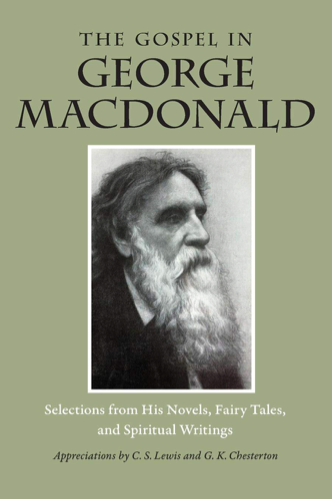“Even in the years of MacDonald’s greatest popularity as a writer, the family was never financially secure, but his confidence that God would provide was never disappointed. MacDonald received very little in royalties for his books, in part because pirated editions appeared on both sides of the Atlantic. Additional income came from occasional lectureships and the amateur family dramatic productions [his wife] Louisa organized, and in 1877 Queen Victoria — who had given his children’s books to her grandchildren — gave MacDonald a small Civil List pension. Despite the family’s habitually penniless state, their home was widely known as a place of genial hospitality where anyone, from an orphan child to Alfred Lord Tennyson, the poet laureate, would find welcome. One guest wrote, ‘In some wonderful way, all classes, nations, and creeds met willingly under that roof.’
“One of MacDonald’s early admirers was Lady Byron, the widow of the poet, who sponsored a family trip of several months to Algiers in 1858 after doctors advised Mediterranean air for MacDonald’s tuberculosis. John Ruskin and Lewis Carroll were especially close friends — the MacDonald children were the first to read the manuscript of Alice’s Adventures in Wonderland, and it was their enthusiastic response that convinced Carroll to publish it. MacDonald enjoyed similar relationships among the American literary establishment: during a lecture tour in the northeast in 1872, his itinerary included visits with Ralph Waldo Emerson, John Greenleaf Whittier, and Henry Wadsworth Longfellow. He and Mark Twain struck up an unlikely friendship and discussed co-authoring a book.
“But more important to him than his famous acquaintances was his desire to reach a broad public with the gospel message. Apart from writing, he lectured to crowds of up to eight thousand. According to one newspaper account, ‘There is something indescribable about the man which holds the audience till the last word. It is not eloquence or poetry, nor is there any straining for effect, but it is the man’s soul that captivates. You love the man at once.’”
— from Marianne Wright, The Gospel in George MacDonald: Selections from His Novels, Fairy Tales, and Spiritual Writings (Plough Publishing House, 2016)
Related reading and listening
- A prophetic “wake-up call” — In this 2024 lecture honoring the bicentennial of George MacDonald’s birth, Malcolm Guite explores MacDonald’s power to awaken readers’ spirits and effect in them a change of consciousness. (59 minutes)
- Perceiving truths that dazzle gradually — Rolland Hein on lessons from George MacDonald about the imagination as a spiritual faculty
- We wonder as they wander — Daniel Gabelman on the spiritual geography of George MacDonald’s fairyland
- Foolishness, gravity, and the Church — In this essay, Albert L. Shepherd V explains why George MacDonald’s story “The Light Princess” is meant for “all who are childlike in faith and imagination.” (8 minutes)
- Victorian ideas about belief and doubt — FROM VOL. 148 Timothy Larsen situates George MacDonald within a Victorian understanding of faith and doubt. (17 minutes)
- “Prophet of holiness” — Timothy Larsen discusses a new edition of George MacDonald‘s Diary of An Old Soul, a slim book of poem-prayers to be read daily as a devotional aid. (30 minutes)
- “A state of divine carelessness” — FROM VOL. 121
Daniel Gabelman attempts to correct the notion that George MacDonald prizes seriousness and sobriety. (20 minutes)
- Wright, Marianne — FROM THE GUEST PAGE: Marianne Wright, a member of the Bruderhof, lives in southeastern New York with her husband and five children.
- In the image of an Imaginer — Dorothy L. Sayers on the inevitability of analogical language about God (and everything else)
- A George MacDonald symposium — Excerpts from four interviews talking about the work of George MacDonald: Michael Di Fuccia, Marianne Wright, David Fagerberg, and Daniel Gabelman. (28 minutes)
- George MacDonald on the imagination — Readings from two essays by George MacDonald about how the human imagination is “made in the image” of God’s imagination. (20 minutes)
- Christina Rossetti and George MacDonald revisited — Alan Jacobs talks about the theme of renunciation in Christina Rossetti’s poems, and Stephen Prickett looks at aspects of nineteenth-century Romanticism from which George MacDonald’s work emerges. (33 minutes)
- Mars Hill Audio Journal, Volume 148 — FEATURED GUESTS:
Steven D. Smith, Willem Vanderburg, Jeffrey Bilbro, Emma Mason, Alison Milbank, and Timothy Larsen
- How myth speaks to deep desires in the human heart — Rolland Hein explains that George MacDonald is a writer of myth functioning rightly, and that such myth affects people a-rationally, stirring something in them much deeper than intellect or emotion alone. (15 minutes)
- Mars Hill Audio Journal, Volume 142 — FEATURED GUESTS:
Stanley Hauerwas, Perry L. Glanzer, Nathan F. Alleman, Jeffrey Bishop, Alan Jacobs, D. C. Schindler, and Marianne Wright
- Gisela Kreglinger: Victorian Wisdom for Contemporary Plights — Gisela Kreglinger considers how George MacDonald’s perspective on gender roles might guide us through some of the questions, problems, and concerns we face today. (68 minutes)
- Mars Hill Audio Journal, Volume 121 — FEATURED GUESTS:
Daniel Gabelman, Curtis White, Michael Hanby, Alan Jacobs, James K. A. Smith, Bruce Herman, and Walter Hansen
- Mars Hill Audio Journal, Volume 76 — FEATURED GUESTS: D. H. Williams, Catherine Edwards Sanders, Ted Prescott, Martin X. Moleski, Stephen Prickett, and Barrett Fisher
- Mars Hill Audio Journal, Volume 75 — FEATURED GUESTS: Mark Malvasi, John Lukacs, Steve Talbott, Christian Smith, Eugene Peterson, and Rolland Hein
